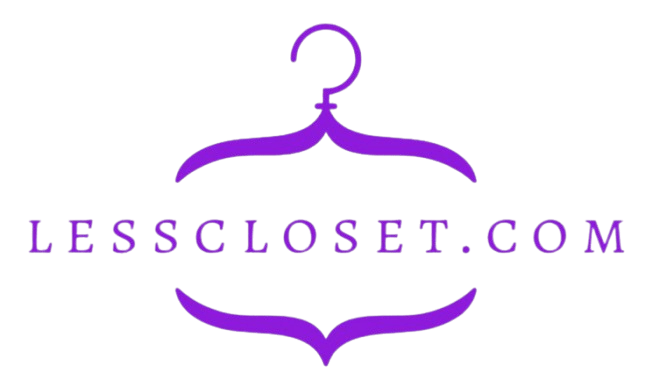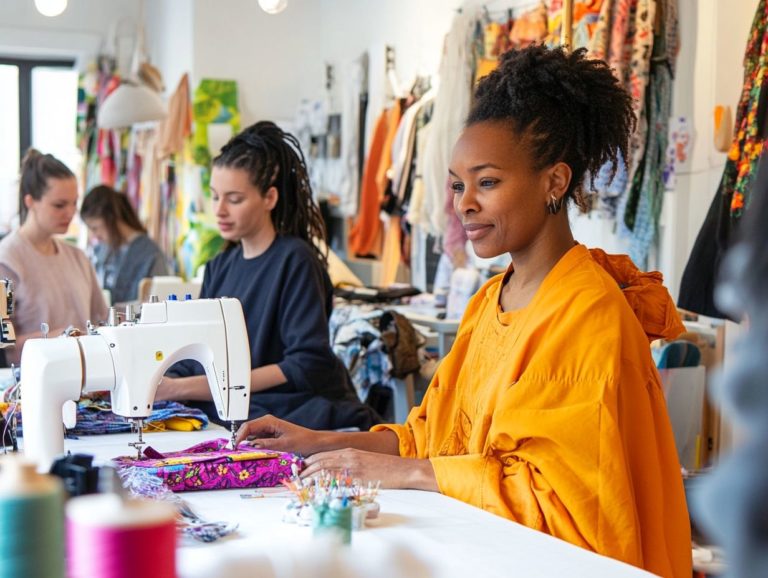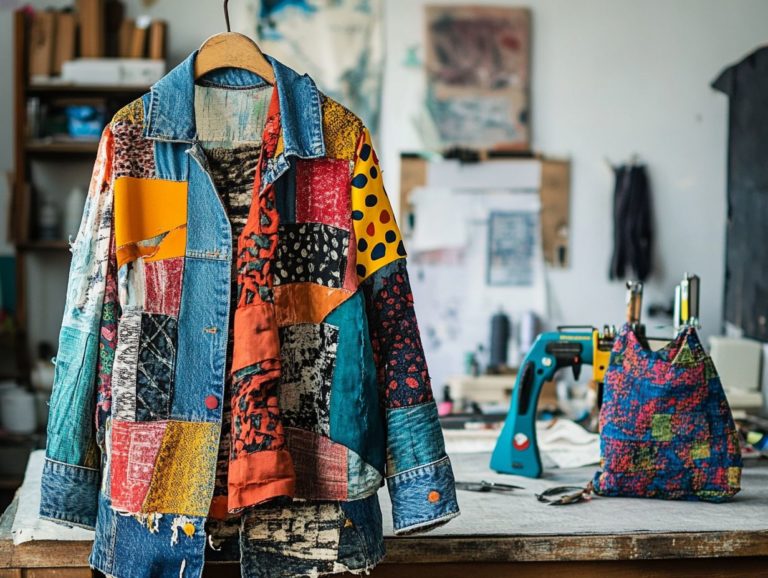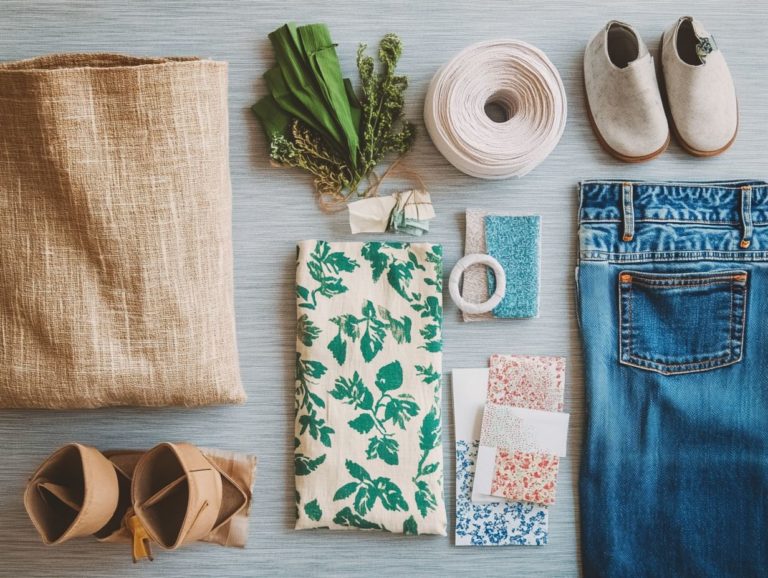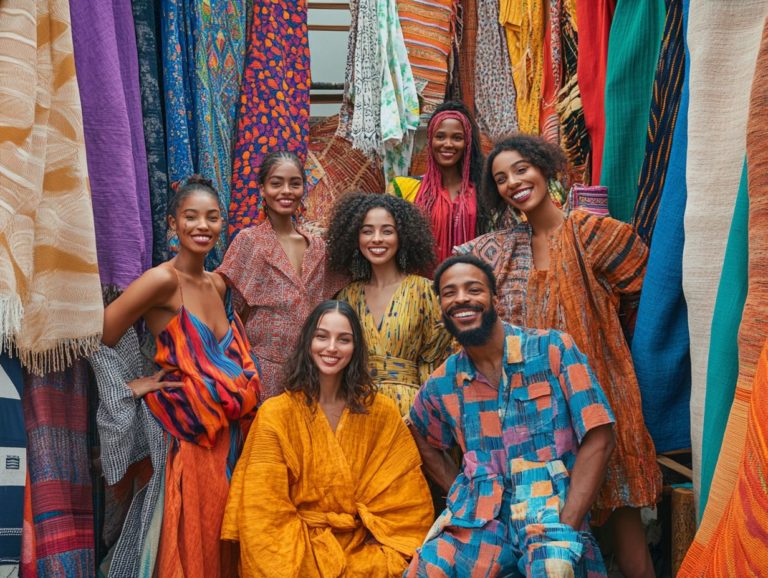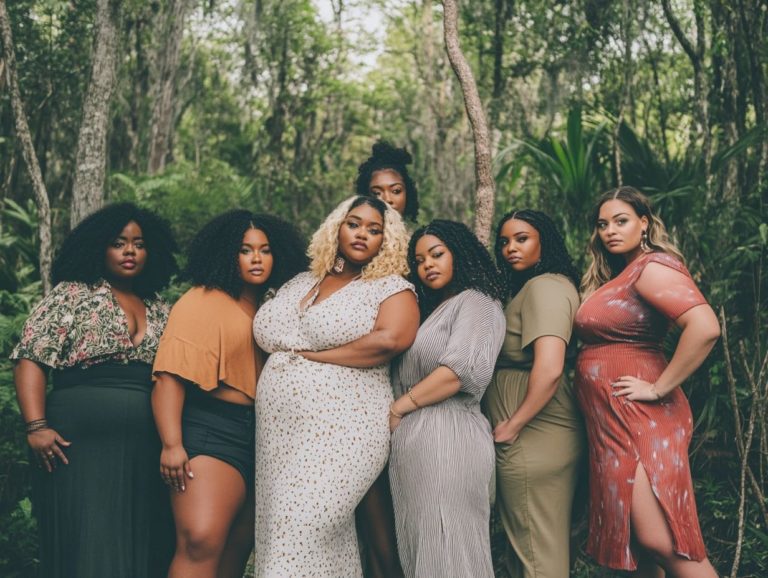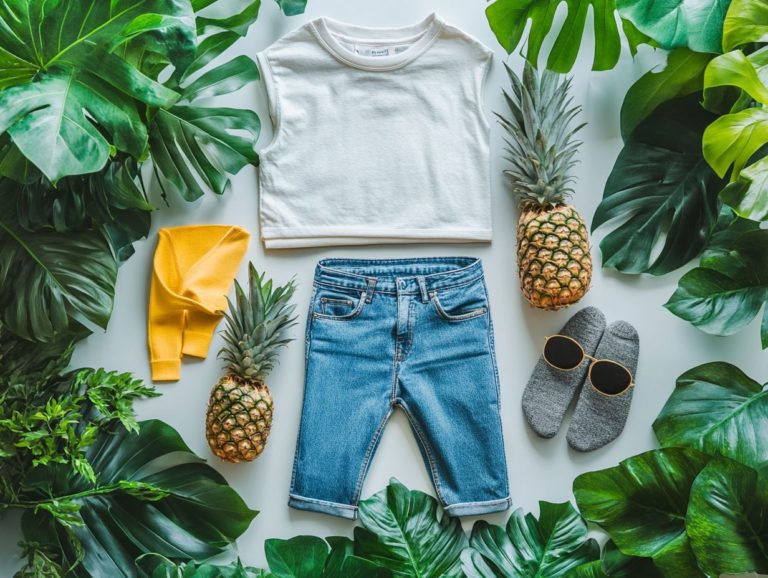5 Essential Questions to Ask Fashion Brands
In today’s fashion landscape, the choices you make as a consumer can significantly impact both the environment and society.
With growing awareness around sustainability, ethical labor practices, and inclusivity, it’s essential to be well-informed about the brands you choose to support.
This outlines five vital questions to ask fashion brands, addressing materials, supply chain ethics, labor standards, and brand values.
You ll discover why these inquiries are crucial and how they empower you to make more responsible fashion choices.
Contents
- Key Takeaways:
- 1. What Materials Are Used in Your Clothing?
- 2. How Do You Ensure Ethical and Sustainable Practices in Your Supply Chain?
- 3. What Steps Do You Take to Ensure Fair Labor Standards for Your Workers?
- 4. How Do You Address Diversity and Inclusivity in Your Brand?
- 5. What Is Your Brand’s Mission and Values?
- Why Is It Important to Ask These Questions to Fashion Brands?
- What Are the Consequences of Supporting Unethical Fashion Brands?
- How Can Consumers Hold Fashion Brands Accountable?
- What Are Some Red Flags to Look Out for When Researching Fashion Brands?
- What Are Some Resources for Finding Ethical and Sustainable Fashion Brands?
- How Can Consumers Support and Promote Ethical Fashion Brands?
- Frequently Asked Questions
- What are the five key questions to ask fashion brands?
- Why are a brand’s mission and values important?
- Why is it vital to know a brand’s target customers?
- How can we confirm that brands practice sustainability?
- What questions help us ensure ethical production in fashion brands?
- How do brands stay updated with trends and customer needs?
Key Takeaways:

- Ask about materials: Inquire about the materials used in clothing to ensure ethical and sustainable practices.
- Hold brands accountable: Consumers can hold fashion brands accountable by asking questions and supporting ethical practices.
- Research red flags: Look out for red flags when researching fashion brands to avoid supporting unethical practices.
1. What Materials Are Used in Your Clothing?
In today s fashion landscape, understanding the materials in your clothing is essential not just for ensuring quality but also for making informed choices that reflect your commitment to ethical and sustainable practices.
This awareness sends a powerful message about your values toward the community and the environment. With consumers increasingly demanding transparency in the supply chain, your choice of materials can significantly shape your perception of a brand.
Many brands are now embracing materials like organic cotton, cultivated without harmful pesticides and fertilizers, making it a healthier option for both the planet and its inhabitants.
Similarly, recycled polyester, crafted from post-consumer plastic bottles, plays a pivotal role in reducing waste and minimizing the ecological footprint associated with traditional fabric production.
Innovative fabrics like Tencel, made from trees, derived from sustainably sourced wood pulp, further highlight the remarkable potential of eco-friendly textiles.
By prioritizing sustainable materials, brands not only contribute to improved environmental practices but also align themselves with ethical production processes that emphasize fair labor and safe working conditions.
This ultimately fosters a more responsible fashion industry that you can feel good about supporting.
2. How Do You Ensure Ethical and Sustainable Practices in Your Supply Chain?
Ensuring ethical and sustainable practices in your supply chain requires a clear plan that emphasizes accountability and transparency at every stage from sourcing materials to production and distribution.
This means actively selecting ethical suppliers who prioritize fair labor standards and environmentally friendly processes.
By doing so, you’re not just supporting responsible business practices; you’re also fostering community development.
Monitoring your supply chain for sustainability allows you to identify areas for improvement, ensuring that your practices align with social and environmental responsibility.
Engaging with local communities adds another layer of integrity and cultivates consumer trust, especially as customers increasingly seek out businesses that embody ethical values.
Together, these efforts forge a more resilient and responsible business model that benefits everyone involved.
3. What Steps Do You Take to Ensure Fair Labor Standards for Your Workers?
Ensuring fair labor standards for garment workers is a fundamental commitment that ethical fashion brands must uphold.
This commitment requires you to implement rigorous auditing processes and maintain transparency while continually engaging with your workforce.
To effectively uphold these standards, you should conduct regular audits that scrutinize working conditions and ensure compliance with labor laws.
These audits work hand in hand with robust worker feedback mechanisms, allowing employees to express their concerns without the fear of retaliation.
Collaborating with non-governmental organizations (NGOs) further strengthens your efforts, providing additional oversight and resources to ensure accountability.
Such measures are essential for fostering trust within the workforce, ultimately leading to improved working conditions that benefit everyone involved in the garment industry.
Explore these questions with your favorite brands today!
4. How Do You Address Diversity and Inclusivity in Your Brand?

Addressing diversity and inclusivity within your brand transcends mere trend; it s an essential element in cultivating a community that truly reflects the varied needs and interests of consumers.
This approach fosters a sense of belonging and trust within the ethical fashion landscape.
Prioritizing diverse representation in your marketing materials allows you to connect with a wider audience. It also showcases the unique narratives of different cultures.
Collaborating with marginalized communities not only amplifies voices that are often overlooked but also leads to the creation of rich, culturally inspired products that genuinely resonate with consumers.
Embracing inclusive sizing ensures that everyone feels valued and represented. This reinforces the notion that fashion should be accessible to all.
These initiatives enhance consumer engagement and assist in building a loyal customer base that truly appreciates and supports brands committed to authentic inclusivity.
5. What Is Your Brand’s Mission and Values?
Your brand’s mission and values should reflect what you stand for. They should drive every decision and action toward promoting fashion that is fair and responsible.
This commitment to sustainability goes beyond mere marketing; it weaves itself into the very fabric of your operations.
It shapes how products are sourced, produced, and marketed.
By emphasizing community engagement, you create meaningful connections with stakeholders.
This fosters a sense of belonging and mutual respect.
Involving local artisans and using ethically sourced materials enhances transparency. This allows consumers to grasp the impact of their purchases.
Ultimately, these principles help create a marketplace where ethics matter, ensuring that every transaction becomes an opportunity for positive change and a stride toward a more sustainable future.
Why Is It Important to Ask These Questions to Fashion Brands?
Asking critical questions about the practices of fashion brands is vital for nurturing a more transparent and accountable industry.
This enables you, the consumer, to make informed choices that contribute to social impact and sustainability within the fashion sector.
By actively engaging in consumer inquiry, you can demand clarity on supply chains, labor conditions, and environmental practices.
This prompts brands to adopt ethical standards.
Your heightened awareness leads to a ripple effect, as brands begin to recognize the importance of maintaining their reputation and earning your trust.
When fashion companies are pressed for answers, it encourages them to disclose their practices and reflect on their broader responsibilities toward environmental stewardship and social justice.
Ultimately, a well-informed consumer base like yours can drive significant change, steering the industry toward more sustainable and ethical practices.
What Are the Consequences of Supporting Unethical Fashion Brands?
Supporting unethical fashion brands can lead to serious repercussions. This impacts not only the environment and garment workers but also you, the consumer.
When you choose to overlook the origins of your clothing, you inadvertently become part of a cycle that perpetuates exploitation and environmental degradation.
The fashion industry is infamous for its harmful effects think toxic waste polluting local ecosystems and dangerous working conditions for the laborers behind the garments you wear.
As consumer awareness increases, the erosion of trust in brands that engage in unethical practices becomes glaringly obvious.
Accountability isn’t just a trendy term; it’s essential.
By demanding transparency, you can help create a fashion ecosystem that prioritizes ethical practices. This ensures that your choices can truly show your commitment to sustainability and respect for human rights.
Are you ready to make a difference with your fashion choices?
How Can Consumers Hold Fashion Brands Accountable?

Consumers hold a critical position in ensuring that fashion brands remain accountable. They use social media platforms to demand transparency and champion companies that prioritize ethical practices and sustainability.
In today s digital landscape, you can effortlessly mobilize your network to amplify your voice. Voice your concerns about labor practices and environmental issues tied to various brands. Sign petitions and join campaigns to put real pressure on companies. Your voice can drive change toward responsible policies!
Your choices in ethical purchasing can shift market demand toward brands committed to sustainability. This demonstrates the profound impact that collective consumer action can wield. Growing awareness cultivates an environment where fashion brands feel motivated to implement meaningful changes, ensuring a positive influence on the industry.
What Are Some Red Flags to Look Out for When Researching Fashion Brands?
Identifying red flags while researching fashion brands is essential if you want your purchases to reflect ethical standards. This awareness helps you steer clear of companies that lack transparency and accountability in their practices.
To effectively navigate the intricate landscape of fashion consumption, recognizing specific warning signs is important. Vague claims of sustainability often disguise a lack of true commitment to environmentally friendly practices. If a brand provides limited information about its sourcing methods, it raises valid questions about the integrity of its supply chain.
Look out for the absence of third-party certifications. These typically indicate a brand s adherence to established ethical standards. Together, these indicators serve as invaluable tools, enabling you to make informed choices and support brands that genuinely prioritize ethical values.
What Are Some Resources for Finding Ethical and Sustainable Fashion Brands?
Numerous resources are available to help you discover ethical and sustainable fashion brands. This enables you to make informed choices that align with your values and champion responsible practices in the industry.
Among these resources are dedicated websites and apps that curate extensive lists of brands committed to ethical practices, like Good On You and Ethical Fashion Forum. Social media platforms, especially Instagram and Pinterest, have evolved into vibrant hubs for exploring recommendations and uncovering sustainable fashion gems.
Community suggestions play a vital role in this journey. Personal reviews from fellow consumers offer valuable insights into brand practices and product quality. By tapping into these resources, you can confidently navigate the often-daunting world of fashion while contributing to a more sustainable future.
How Can Consumers Support and Promote Ethical Fashion Brands?
You can actively support and promote ethical fashion brands by sharing information on social media, engaging in community initiatives, and making conscious purchasing decisions that resonate with your values.
Participate in campaigns that raise awareness about sustainability. Amplify your voice and inspire others to take similar actions! Social media platforms offer a compelling way to highlight brands that prioritize ethical practices and connect with like-minded individuals, fostering a community dedicated to positive change.
When you choose to shop from brands that demonstrate a commitment to environmentally friendly methods and fair labor practices, you re not just making a personal statement. You re directly contributing to a more sustainable future in the fashion industry.
Frequently Asked Questions
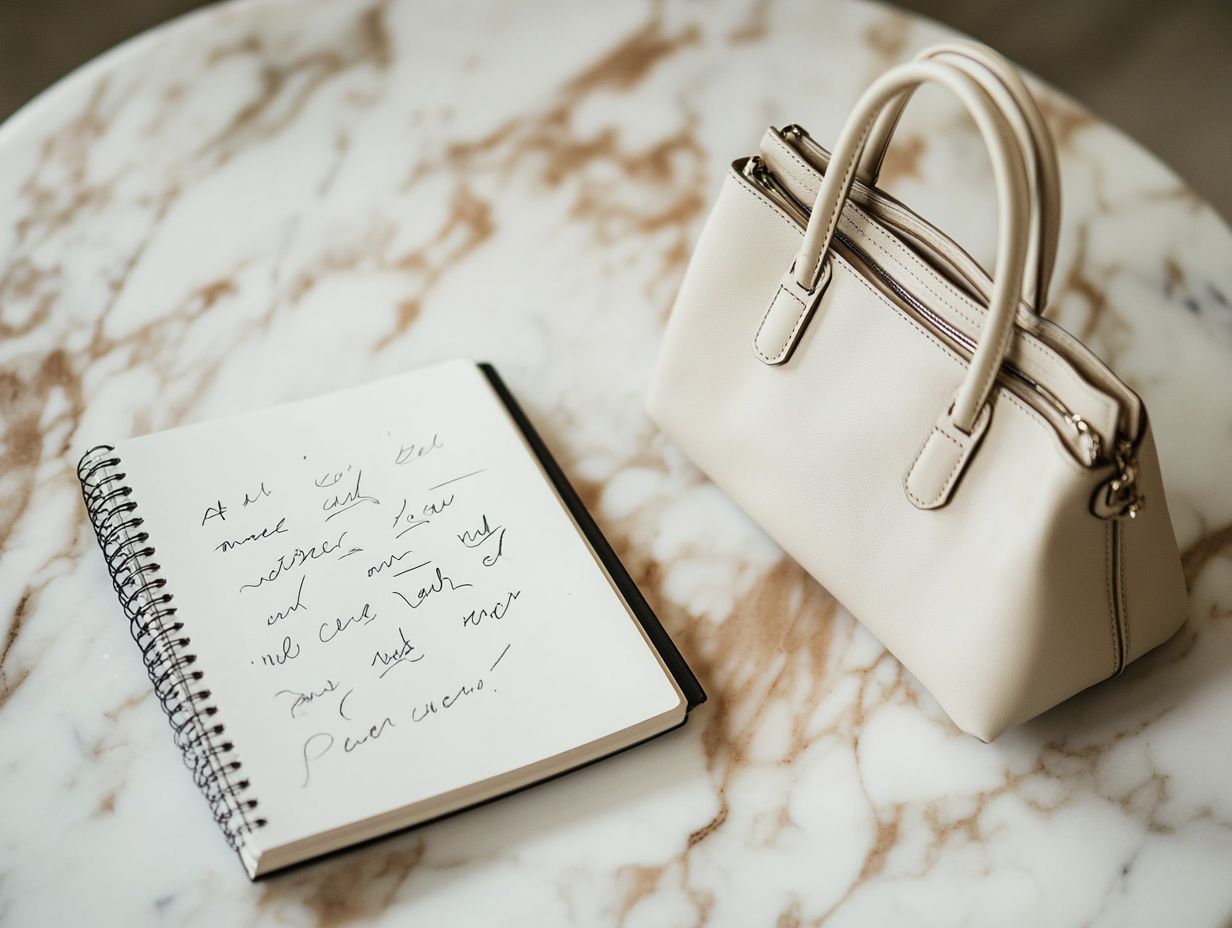
What are the five key questions to ask fashion brands?
The five key questions are:
- What is your mission and values?
- Who are your target customers?
- What sustainable practices do you follow?
- How do you ensure ethical production?
- How do you stay updated with fashion trends and customer needs?
Why are a brand’s mission and values important?
Understanding a fashion brand’s mission and values reveals its purpose. This helps you see if it aligns with your own values and if its products are made ethically.
Why is it vital to know a brand’s target customers?
Knowing a brand’s target customers provides insight into its market. It helps you see if its products fit your style and needs.
How can we confirm that brands practice sustainability?
Ask about their manufacturing processes and sourcing of materials. Research their certifications and partnerships for sustainability.
What questions help us ensure ethical production in fashion brands?
Inquire about labor practices, fair wages, and working conditions. Ask how they combat child and forced labor.
How do brands stay updated with trends and customer needs?
Brands attend fashion shows and research trends. They also use customer feedback and collaborate with influencers to innovate.
